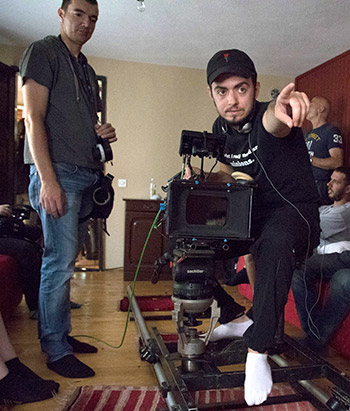
Erblin Nushi and his production crew drew the attention of a Kosovar public interested in films detailing a chapter in their nation's history of conflict. Photo courtesy of Tilia Entertainment.
Congratulations go out to Mason Film and Video Studies alum Erblin Nushi (FAVS, 2018). Erblin's Senior Thesis film, BINI, just advanced as a Finalist for a Student Academy Award in the Narrative category. BINI is one of only 8 films in this category and the only film made by an undergraduate.
This is George Mason University's first student Academy Award nominee and finalist. BINI is based on the true story of the day he and his family became refugees during the war in Kosovo. We are proud that his film is being recognized for his artistry and bravery. BINI made its Los Angeles premiere on Friday, August 17, 2018 at the academy-qualifying Holly Shorts Film Festival.
"During my two years at Mason, I was shaped to be the filmmaker I am by giving me the space and encouragement to tell stories that are personal and stories that matter,” said Nushi. BINI is exactly that. I took the opportunity to give a voice to all those lives lost during the war and spread awareness about the horrid events of 1999 in my home country, Kosovo.”
He said he would like to thank the faculty that has guided him through this process, and the Academy for this prestigious opportunity.
The Academy created the student awards in 1972 to support and encourage excellence in filmmaking at the collegiate level. The awards will take place Thursday, Oct. 11, 2018 at the Academy’s Samuel Goldwyn Theater in Beverly Hills.
The memories of the day armed Serbian soldiers chased his family from their home in Kosovo 19 years ago come and go, said Nushi. Rounded up in the city square of Peja, the Nushis and others were loaded into trucks and covered with tarps for a six-hour ride on an unpaved road to the Albanian border. There was little air in the truck and several people suffocated, Nushi said. Nushi’s father used a utility knife to make a life-saving hole in the tarp so Nushi and his siblings could breathe.
“These are the mini-flashbacks I have,” he said.
That day is documented in a 19-minute short narrative film titled “BINI,” written and directed by Nushi and filmed over the course of a month in Kosovo last summer.
It’s been a remarkable—if dangerous—journey, and the 6-year-old homeless refugee in a war zone is now a budding 25-year-old filmmaker.
Nushi and his crew, including three other George Mason students and a professor, had barely more than a month to find locations, cast six speaking and 40 nonspeaking roles, rehearse the actors, design the wardrobe, shoot the film, edit the footage and compose the score.
Along the way Nushi appeared on five television talks shows—“and always wearing my Mason hat,” he said—as the production drew the attention of a Kosovar public interested in films detailing a chapter in the nation’s history of conflict.
“The whole country knew we were there making this film,” he said.
He also encountered Kosovar film personalities he idolized as a child, and he was able to hire two actors featured in the Oscar-nominated 2016 short film, Shok.
Nushi came to the United States with his family in 2010. He transferred to Mason after two years at Northern Virginia Community College, where he focused his studies on his first love, acting. But as a film and video studies (FAVS) major at Mason he was compelled to make short films—and discovered an affinity. BINI is the ninth film he’s made in two years at Mason.
“Honestly, I still prefer acting,” he said, “but storytelling is addicting.”
“He’s one of the most prolific filmmakers and one of the most talented students we have,” said Lisa Thrasher, the FAVS Professor of Film Business and Producing and the producer of BINI.
Thrasher, who accompanied the Mason team to Kosovo, said Nushi raised the $15,000 budget for BINI himself by bundling money from awards, scholarships, a work-study job, donations from friends and family, and donations via an Indiegogo crowd-funding campaign. “The department has supported his talent and his energy” with gear, personnel and encouragement, Thrasher said.
“I have been in this country for seven years,” Nushi said, “and I don’t think I would have gone to Kosovo and did what I did without [FAVS]. I thought when I came to Mason I would get a diploma, but I got a lot more.”
